Discover how the Bible's tales of anger reveal deeper lessons on emotion and justice, inviting us to explore our own responses.
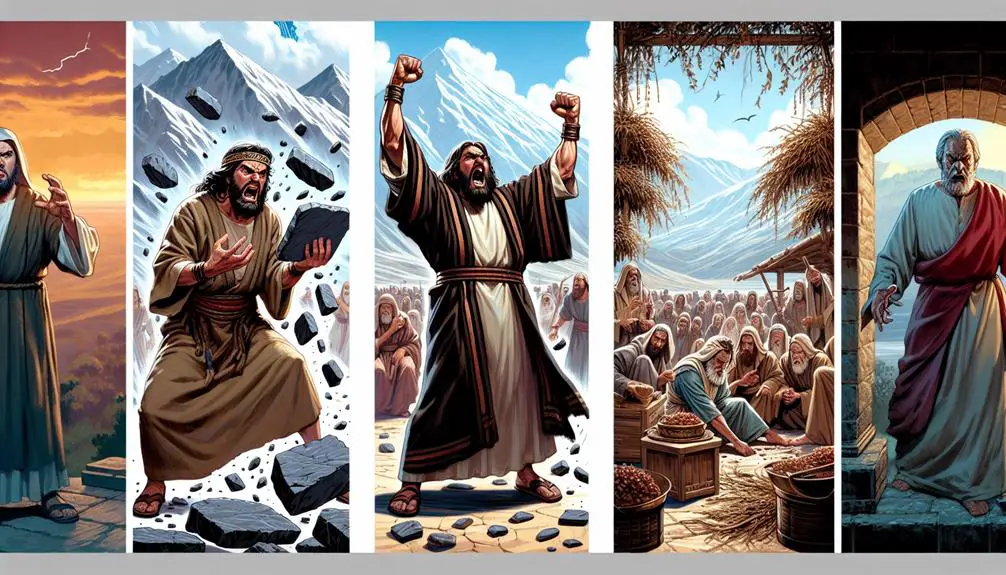
Examples of Anger in the Bible
Throughout the pages of the Bible, you'll encounter moments where tempers flared and patience wore thin, to put it mildly. From God's profound disappointment leading to the flood, to Jesus' fervent response to the money changers in the temple, these narratives offer a complex perspective on anger, divine justice, and human emotion.
You're about to step into a discussion that not only sheds light on these intense moments but also explores the lessons they hold for understanding anger's role and management. Let's embark on this journey together, and you might find surprising insights into how these ancient stories resonate with modern challenges.
Key Takeaways
- Anger in the Bible often serves as a catalyst for divine judgment and retribution, as seen in the Great Flood.
- Biblical figures like Moses and Jesus demonstrate righteous anger in response to injustice and disrespect towards sacred covenants and spaces.
- Unchecked emotions such as jealousy and envy, exemplified by Cain and Saul, lead to destructive outcomes and personal downfall.
- Stories of anger in the Bible underscore the importance of emotional self-awareness, justice, and the pursuit of righteousness in challenging situations.
God's Wrath in the Flood

One of the most profound examples of God's wrath in the Bible is manifested through the Great Flood, where divine displeasure led to a cataclysmic cleansing of the earth's wickedness. This narrative isn't merely a tale of destruction but a complex interplay of divine patience and human response, inviting you to delve deeper into the theological implications of God's anger.
Before the floodwaters engulfed the world, there was a significant period marked by divine patience. You're invited to consider this patience not as passive waiting but as an active period of grace, offering humanity a chance for repentance. It's essential to recognize that God's wrath isn't impulsive; it's a response to prolonged defiance and wickedness. The human response to this patience, unfortunately, was continued disobedience, illustrating a tragic failure to heed divine warnings.
Analyzing this narrative, you're encouraged to see beyond the surface-level act of destruction to understand the flood as a divine reset, a sorrowful but necessary act to eradicate the pervasive evil and start anew. The interplay between divine patience and human response in this story underscores a critical theological point: God's wrath is deeply intertwined with God's love and justice. It's not arbitrary but a response to human actions, highlighting the consequences of ignoring divine patience and guidance.
Moses Breaks the Tablets

In the narrative where Moses breaks the tablets, we observe another potent manifestation of anger, this time reflecting a human conduit of divine displeasure. This episode, found within the rich tapestry of biblical stories, isn't merely an outburst but a profound leadership test for Moses and a pivotal moment of covenant symbolism for the Israelites.
As you delve deeper into this account, it becomes evident that Moses' anger isn't an uncontrolled, personal vendetta. Rather, it's a calculated demonstration of the severity of the Israelites' betrayal. They've forged an idol, a golden calf, directly contravening the very essence of their covenant with God. Moses' shattering of the stone tablets, upon which the Ten Commandments were inscribed, symbolizes the fracture of this sacred agreement. It's a physical manifestation of the spiritual breach perpetrated by the people.
This act also serves as a critical test of Moses' leadership. He stands at the intersection of divine will and human frailty, embodying the tension of a leader tasked with guiding a wayward people back to their covenantal commitments. His response to their sin isn't just punitive; it's instructive, intended to realign the community's focus on their foundational values.
Moreover, the breaking of the tablets underlines the covenant's symbolism. It's a stark reminder that the relationship between God and His people isn't to be taken lightly. The covenant is a living, breathing entity, demanding respect, adherence, and reverence.
Jonah's Displeasure at Nineveh's Repentance
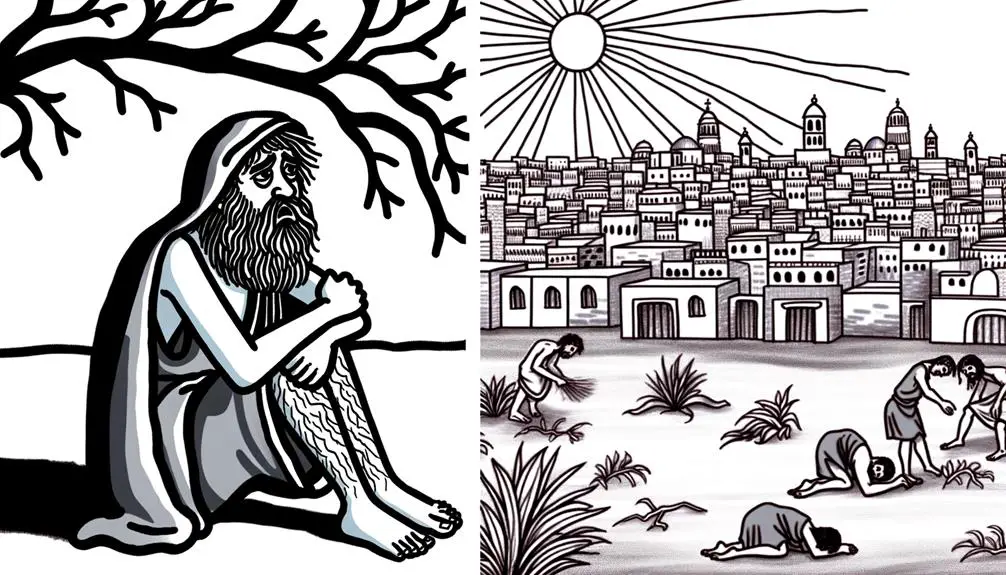
Although Jonah successfully warned Nineveh of impending divine judgment, he found himself deeply troubled by their subsequent repentance and God's decision to spare the city. This narrative is a profound exploration of human emotions in the face of divine mercy and forgiveness. Jonah's displeasure wasn't rooted in the failure of his prophetic mission but in his struggle to reconcile his desire for retributive justice with God's boundless compassion.
Jonah's reaction to Nineveh's mercy provides a stark contrast to the typical expectations of a prophet's role. Prophets are often seen as intercessors who plead on behalf of the people for God's mercy. However, Jonah's anger reveals a more complex human side of these divine messengers. His displeasure underscores a significant theological tension between justice and mercy, a theme that resonates throughout the biblical narrative.
The story of Jonah isn't merely an account of a prophet's mission but also a narrative of Jonah's transformation. Initially, he runs from God's command, fearing the implications of Nineveh's repentance. Yet, through his journey, Jonah is confronted with his own shortcomings and God's infinite mercy. This transformation is crucial, as it highlights the process of understanding and accepting God's will, even when it conflicts with personal desires or societal expectations.
In analyzing Jonah's displeasure at Nineveh's repentance, we're invited to reflect on our own responses to divine mercy and forgiveness. Jonah's story teaches us the importance of compassion and the transformative power of understanding God's boundless love for all creation.
Cain's Jealous Rage
Shifting focus, we now examine Cain's jealous rage, a foundational story that further explores the complex interplay between human emotions and divine intentions within the Biblical narrative. You find within this account an early depiction of sibling rivalry, magnified by divine preference for one brother's sacrificial offering over the other's. This preference wasn't arbitrary but based on the heart and the quality of the offerings given.
Cain's reaction to God favoring Abel's offering over his own is one of the most poignant expressions of anger and jealousy in the Bible. It's a story that delves deep into the human condition, illustrating how unchecked emotions can lead to catastrophic actions.
Consider the following points to understand the depth of Cain's emotional turmoil:
- *Cain's anger wasn't just a spontaneous outburst; it was a simmering jealousy that grew over time, reflecting the deep-seated nature of sibling rivalry.*
- *The rejection of his sacrificial offering by God was perceived not just as a divine disfavor but as a personal slight, intensifying his feelings of inadequacy and resentment.*
- *Cain's inability to manage his emotions or seek reconciliation led to the irreversible act of fratricide, marking a tragic first in human history.*
- *This story serves as a cautionary tale about the destructive potential of jealousy and the importance of mastering one's emotions.*
Through Cain's tale, you're invited to reflect on the dangers of letting jealousy and anger dictate your actions. It's a scholarly reminder of the need for self-awareness and emotional regulation in navigating the complexities of human relationships and divine expectations.
Jesus Cleanses the Temple
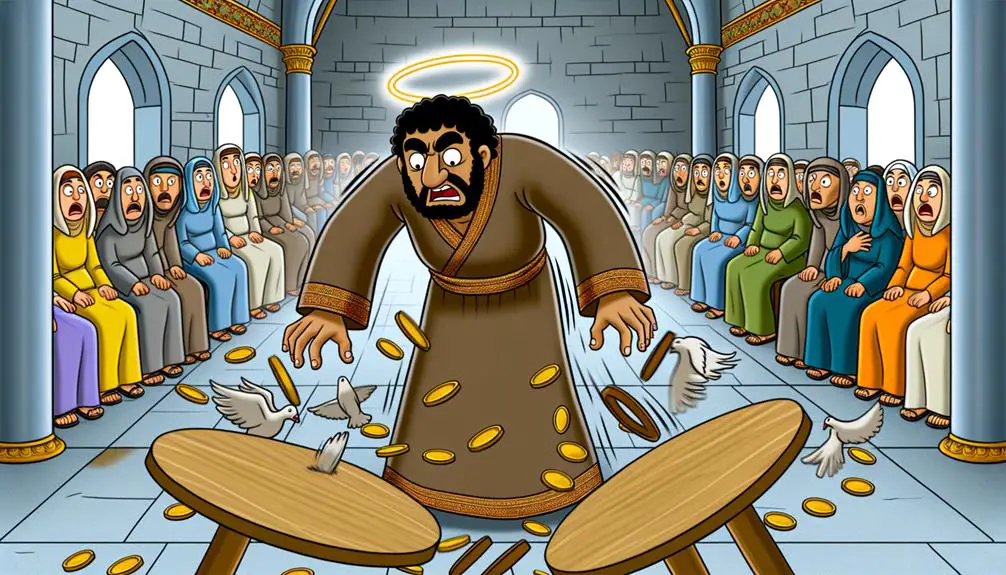
As you explore the narrative of Jesus cleansing the temple,
you'll uncover a profound demonstration of righteous anger.
This act, far from a mere outburst, reveals a deep commitment to the sanctity of worship
and a rebuke of exploitation within sacred spaces.
By examining the expulsion of money changers,
you gain insight into the complexities of moral anger and its place in faith.
Temple Cleansing Overview
In a pivotal moment, Jesus takes decisive action by cleansing the Temple, showcasing righteous indignation against its desecration. This event, deeply rooted in historical context, has sparked various modern interpretations, reflecting its significance across ages.
- Historical context plunges us into a world where the Temple wasn't just a religious site but also a socio-political heartland, making Jesus' actions profoundly subversive.
- Modern interpretations wrestle with the implications of Jesus' zeal, challenging believers to discern the line between holy passion and unbridled anger.
- The cleansing act itself, a moment of divine frustration, invites reflection on the purity of worship.
- This narrative's scholarly analysis reveals layers of meaning, underscoring the complexity of interpreting ancient texts with reverence and integrity.
Jesus' temple cleansing underscores a timeless message about the sanctity of worship spaces.
Righteous Anger Displayed
Building upon the understanding of the Temple's historical and spiritual significance, we now explore the manifestation of righteous anger when Jesus cleanses the Temple. This pivotal moment exemplifies not just anger, but anger management and emotional intelligence at their zenith. Jesus' actions are deliberate and measured, revealing a deeply rooted respect for the sacred space that had been compromised.
His response isn't a mere outburst but a calculated display of righteous indignation. This episode teaches you the importance of channeling emotions towards constructive change, highlighting that anger, when rooted in justice and guided by emotional intelligence, can serve a profound purpose. It underscores the distinction between reactive aggression and a controlled, purposeful expression of displeasure against wrongdoing, thereby setting a benchmark for righteous anger management.
Money Changers Expelled
Upon entering Jerusalem's Temple, Jesus encountered a scene that starkly contradicted its intended sanctity: money changers conducting business within its hallowed walls. This event underscores a pivotal moment where cultural practices and the pursuit of economic justice intersect in a profound manner. Jesus' expulsion of the money changers serves as a powerful demonstration against the commodification of religious experiences and exploitation within sacred spaces.
- A call to purity in worship, emphasizing the temple's role as a house of prayer.
- A critique of economic exploitation, highlighting the imbalance and injustice within the temple's commerce.
- A challenge to cultural norms, questioning the integration of profane activities in spiritual contexts.
- A passionate defense of the marginalized, who were excluded from worship due to these practices.
This narrative invites reflection on the sacredness of worship and the pursuit of justice within our communities.
Saul's Envy of David

Saul's envy of David, a pivotal moment in biblical narrative, reveals the deep psychological and spiritual ramifications of unchecked jealousy. This story unfolds as David's humility and God's favor elevate him, triggering Saul's decline into a shadow of his former self. You witness Saul's transformation from a respected leader to a figure consumed by jealousy, illustrating the destructive power of envy.
David's humility stands in stark contrast to Saul's deteriorating state. Despite his victories and the adulation of the masses, David remains modest, attributing his success to the Lord's guidance. This humility only fuels Saul's envy, as he perceives David not just as a rival but as a threat to his throne and legacy. Saul's inability to rejoice in David's achievements or to see them as beneficial to the kingdom highlights a critical lesson: envy blinds one to the value and contributions of others.
Saul's decline is a cautionary tale about the spiritual and psychological consequences of letting jealousy go unchecked. His envy leads to irrational decisions, such as attempting to kill David, which ultimately erodes his authority and respect among his people. It's a stark reminder that jealousy can corrode one's character and destiny.
As you reflect on Saul's envy of David, it's clear that this narrative serves as a profound lesson on the dangers of allowing jealousy to cloud judgment and corrupt one's soul. It underscores the importance of humility, the recognition of others' contributions, and the peril of letting envy dictate one's actions.
Elijah's Frustration With Israel
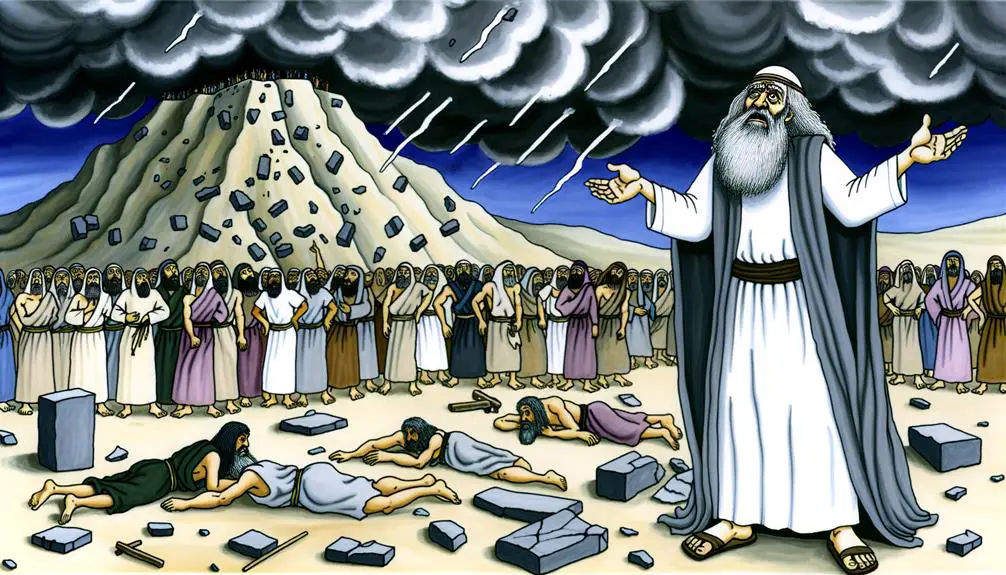
You'll find Elijah's frustration with Israel deeply rooted in his prophetic challenge, where he confronts the nation's apostasy with unwavering zeal. This confrontation underscores a pivotal moment in biblical history, highlighting the struggle between divine fidelity and human disobedience.
As you examine this narrative, consider the profound implications of Elijah's actions and Israel's response on the broader themes of faith and judgment in the scripture.
Elijah's Prophetic Challenge
Elijah's frustration with Israel is a poignant example of prophetic anger, showcasing his deep dismay at their abandonment of Yahweh's covenant. The Mount Carmel showdown epitomizes his challenge, where the Baal prophets were defeated, marking a pivotal moment in Biblical narrative. This event not only illustrates Elijah's courage but also his profound grief over Israel's spiritual adultery.
- The Mount Carmel showdown symbolizes the ultimate test of faith and loyalty.
- Elijah's solitary stand against the Baal prophets underscores his unwavering commitment to Yahweh.
- The defeat of the Baal prophets serves as a divine vindication of Elijah's mission.
- This confrontation evokes a sense of divine justice and retribution against false worship.
Elijah's challenge to Israel is a testament to his prophetic zeal and his relentless pursuit of righteousness amidst apostasy.
Israel's Apostasy Confronted
In confronting Israel's apostasy, the prophet's frustration emerges from a profound sense of betrayal towards a nation that had forsaken its covenant with Yahweh. This breach was glaringly evident in the golden calf idolatry, a stark deviation from divine worship.
The prophets rebuked Israel, not out of spite, but from a deep, reverential concern for the spiritual welfare of a people chosen by Yahweh. This confrontation was a pivotal moment, underscoring the tension between divine expectations and human actions.
The prophets stood as mediators, tirelessly advocating for a return to covenantal faithfulness, illustrating the grave consequences of apostasy. Their rebukes weren't merely criticisms but impassioned pleas for reconciliation with Yahweh, aiming to restore a fractured relationship.
Balaam's Anger With His Donkey

Balaam's anger toward his donkey showcases a profound lesson on divine intervention and human impatience, illuminating the complexities of divine-human relationships in biblical narratives. This story serves as a poignant reminder of the often-overlooked wisdom and perception in God's creation, challenging our preconceived notions about communication and intelligence among beings. The donkey's intelligence, usually underestimated, becomes a central theme, revealing the limitations and barriers in human understanding and communication with the divine.
In this account, the donkey sees an angel blocking their path—a divine intervention invisible to Balaam. Frustrated by the donkey's refusal to move forward, Balaam's anger escalates, leading to a physical reprimand of the animal. This moment of tension underscores several critical insights:
- The donkey's actions, driven by divine insight, contrast sharply with Balaam's blindness to the spiritual realm.
- Balaam's quickness to anger highlights human impatience and the failure to perceive divine messages.
- The miraculous communication between the donkey and Balaam breaks conventional communication barriers, emphasizing the depth of God's involvement in the world.
- This narrative invites reflection on how anger can cloud judgment, obstructing our ability to discern divine guidance.
The story of Balaam and his donkey not only explores the dynamics of anger but also opens a window into understanding the broader divine-human communication. It teaches us to be mindful of the divine presence in all forms and to consider the wisdom that can arise from the most unexpected sources, urging patience and openness to God's mysterious ways.
Frequently Asked Questions
How Does the Bible Differentiate Between Righteous Anger and Sinful Anger?
The Bible differentiates between righteous anger and sinful anger by examining their origins and how one manages them. Righteous anger stems from a place of moral indignation, often in response to injustice or sin, and seeks constructive resolution.
In contrast, sinful anger arises from personal pride or malice and typically leads to harm or discord. Managing your anger righteously involves patience, reflection, and seeking peace, aligning with scriptural wisdom and guidance.
Are There Any Instances Where Anger in the Bible Led to Positive Outcomes or Changes?
Ironically, while you'd think anger only brews trouble, it sometimes catalyzes positive transformations.
Delving into historical narratives, it's fascinating how anger's consequences aren't always dire.
Analyzing these instances with a scholarly lens, you'll uncover that anger, when channeled right, can indeed lead to significant, positive changes.
This insight challenges the notion that anger is purely destructive, revealing its potential to foster growth and improvement in unexpected ways.
How Do Biblical Figures Reconcile With God or Others After Expressing Anger or Committing Acts of Anger?
When reconciling with God or others after expressing or committing acts of anger, biblical figures often engage in forgiveness rituals and practice anger management. These actions demonstrate a profound understanding of human frailty and the power of redemption.
Through sincere apologies, prayer, fasting, and sometimes making restitution, they mend relationships and restore peace. This process reflects a deep reverence for divine guidance and the healing potential of forgiveness, embodying a sacred commitment to transformation and growth.
What Lessons Can Modern Readers Learn About Managing Their Own Anger From These Biblical Stories?
As you explore anger management techniques, remember 'patience is a virtue.' By examining stories of reconciliation and emotional growth, you'll see the importance of developing emotional intelligence.
This journey requires understanding triggers, practicing empathy, and learning forgiveness. Reflecting on these narratives helps you navigate your own anger, encouraging a path towards personal and spiritual growth.
Thus, these lessons become vital tools in managing anger and fostering healthier relationships.
How Do Various Christian Denominations Interpret and Teach About the Expressions of Anger Found in the Bible?
You'll find that Christian denominations vary in how they interpret and teach about expressions of anger, highlighting cultural interpretations and denominational differences.
Some may emphasize forgiveness and patience, drawing on Christ's example, while others might focus on righteous anger against injustice, reflecting on prophets' actions.
Analyzing these teachings, you'll discover a rich tapestry of perspectives, encouraging a balanced and thoughtful approach to understanding and managing anger within a spiritual context.
Conclusion
In analyzing these biblical narratives, you've traversed a landscape where divine and human angers intersect, illuminating the multifaceted nature of wrath. From the stormy seas of the Flood to the tempest in Jesus' heart as he cleansed the temple, anger serves as a divine scalpel, cutting away at injustice and unfaithfulness.
It's clear that, like a double-edged sword, anger in the Bible both destroys and heals, demanding a balance between justice and mercy in the human heart.


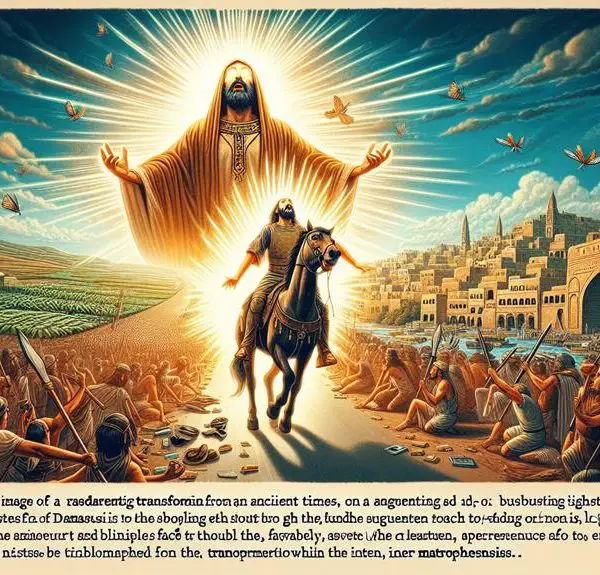
Sign up